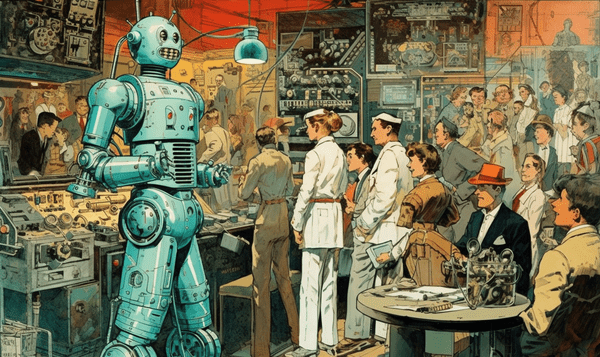In a world where your toaster might soon ask about your emotional state, it’s worth pondering if AI marketing is the future’s brave new frontier or just another tech mirage. Let’s cut the tech jargon: AI is changing the game for marketers.
Today, we’ll embark on a journey into the labyrinth of AI marketing, brushing up against its fascinating corners, its shinier opportunities, and the gritty challenges we face as we make friends with our digital comrades.
Goldman Sachs, not your average soothsayer, but a titan of finance, rolls its eyes at the “AI bubble” whispers. Remember the dot-com drama of the 90s? Some see AI’s rising star and think, “Here we go again.” But Goldman Sachs? They’re ready to place their chips on the AI table.
Our guy Peter Oppenheimer, top dog at Goldman Sachs’ equity strategy team, is rather convinced we’re just toddlers in this tech playground. With AI investments predicted to hit a cool $200 billion by 2025 and generative AI tipped to toss a casual $4.4 trillion into the world’s money jar, it seems we’re onto something big.
With AI’s grand entrance, guess who gatecrashes the party? Ad fraud! The shadier corners of programmatic marketing are buzzing with bots and scam artists, draining advertisers’ pockets faster than you can say “clickbait.” For context, programmatic ad fraud stole the limelight (and cash) with a whopping $65 billion heist in 2021. That’s bigger than the entire credit card fraud scene! It’s like a Hollywood sequel nobody asked for, reminding us to keep our digital wits about us and give fake news and spam the cold shoulder.
AI’s given the fraudsters some new tools, leading to us throwing cash at phantom audiences. Almost a quarter of the money poured into programmatic advertising might just be vanishing into thin digital air. The antidote? Tight partnerships and eagle-eyed vetting.
Voice-activated AIs are the new BFFs. Siri and Alexa aren’t just tech toys; they’re shaping how consumers search. If you own a smartphone (and who doesn’t?), there’s a 97% chance you’ve chatted with an AI. If that’s not a hint for marketers to get voice-savvy, I don’t know what is.
Beyond the voice game, AI is a mastermind in deciphering the hieroglyphics of consumer behavior, predicting the next big thing, and fine-tuning engagement blueprints. Armed with AI, marketers now have the digital sixth sense they never knew they needed.
Think of AI as the ultimate matchmaker, setting up marketers and consumers for meaningful connections, thanks to predictive analytics.
With AI’s uncanny ability to predict trends and desires, the age of hyper-personalization isn’t coming—it’s here. Modern CMOs, like Lisa Cole of Cellebrite, aren’t just leading marketing troops; they’re teaming up with AI, turning it from a tool into a strategic confidant.
Embracing AI isn’t just tech-savvy; it’s downright revolutionary. While the kids these days are often seen as digital natives, it’s the silver surfers who might just have the adaptive edge when it comes to AI. Breaking news: age isn’t a barrier to befriending algorithms!
As AI dives deep into marketing, it stirs up a cocktail of dilemmas:
Are consumers chatting with a bot or Bob from accounting?
Ever heard a chatbot spew nonsense? That’s a “hallucination,” and not the fun kind.
As AI evolves, will it leave human marketers in the dust?
AI’s penchant for “borrowing” content and faces? A tricky legal minefield.
In the swirling dance of AI and marketing, one thing’s clear: AI isn’t some digital diva set to exit the stage. It’s here, reshaping the very core of the marketing cosmos.
Companies harnessing AI are poised to elevate customer joy by a quarter.
So, if you’re placing bets on the future, put your money on a world where AI and marketing groove together, crafting a digital symphony that’s more captivating than ever. AI in marketing isn’t just a trend; it’s the headliner.




